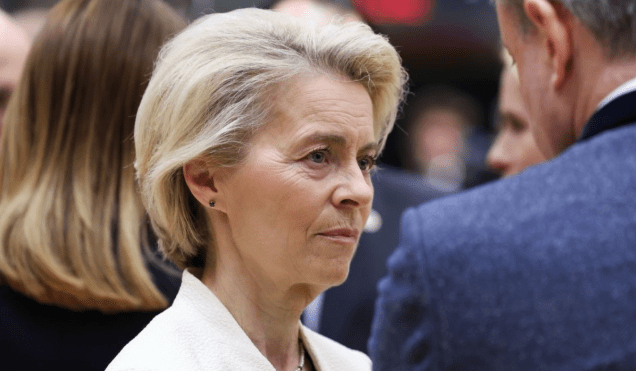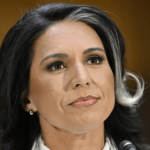As tensions flare within the European Parliament, the President of the European Commission faces mounting pressure. Her centrist coalition is under strain, and many wonder if leaning further right could salvage her legislative agenda. But it’s not that simple.
Last week, the alliance von der Leyen has depended on to pass key legislation nearly unravelled. The trigger? Discontent over the European People’s Party (EPP), her own political group, for attempting to dilute the EU’s ambitious green policies.
This development emboldened right-wing forces, who hailed it as a victory. They claimed the EPP was finally aligning with their views, paving the way for more polarising stances on issues like immigration and climate.
“The most natural outcome would be to have a right-wing majority” when agreeing to the new regulation on deportations, said Dutch MEP Marieke Ehlers, a leading member of the Patriots for Europe group working on that law.
“If the EPP were to work with the left on this file, they would end up with a proposal that is weaker than what their own commissioner has proposed, so I don’t really see how they would sell that to their voters,” she added.
While short-term cooperation with the far right may offer tactical wins, forming a consistent majority is a different story. The right-wing camp is far from unified. Some factions are staunchly pro-Russia; others vehemently oppose it. Ideological fault lines run deep.
“They find it very hard to agree. That, in turn, means they are an unreliable partner for the EPP as a permanent coalition,” warned Richard Corbett, former British MEP and adviser to the European Council president.
Von der Leyen’s position is further complicated by her German roots. As a centrist from a country still haunted by its Nazi legacy, aligning with nationalist extremes poses serious political and ethical risks.
Any reliance on parties that are pro-Kremlin, anti-LGBTQ+, anti-abortion, or hostile to the EU could starkly contradict her fundamental values.
Though some see potential cooperation with the European Conservatives and Reformists (ECR) group, led by Italy’s Giorgia Meloni, it’s much harder to envision regular collaboration with the Patriots, whose ranks include Hungary’s Viktor Orbán and France’s Marine Le Pen. The idea of working with Germany’s far-right AfD is even more controversial.

Back home, German Chancellor Friedrich Merz is actively opposing the AfD. Among the trio of German Christian Democrats in Brussels, only EPP leader Manfred Weber has entertained working with the far right.
“Weber is the only one. So von der Leyen is careful, Merz is very careful for national reasons, and Weber, he’s the only one that really doesn’t have any shame of cooperating with the far right,” said Sophia Russack, a researcher at the Centre for European Policy Studies.
Von der Leyen “clearly does not like to cater to the far right, she has demonstrated that in her first term. The majority that she built most of her legislation on was the centre left and right, the centrist majority,” she added.
Even when the right-wing bloc can help block policies, their usefulness ends there. As seen with the 2025 EU budget guidelines, things can unravel fast. Initially, the EPP worked with the Socialists, liberals, and Greens. Then, in a dramatic pivot, they sided with the far right to push for stricter language on border controls.
The result? A complete collapse in support. All three mainstream groups voted against the resolution. Even the Patriots, despite securing some migration amendments, deemed the overall package “unacceptable.”
As Rasmus Andresen, an MEP from the Greens, put it: “If you like relying on the far right, then maybe you will get an amendment passed, but you will not get the budget passed.”
While there is a shared desire across the right-wing bloc to scale back green policies, extremists often go further. Many demand full repeal of environmental laws — a red line for several EPP members who still back strong climate action.
Internal divisions within the EPP would be hard to contain. Even within the EPP, cracks are showing. Polish Prime Minister Donald Tusk has clashed repeatedly with nationalist rivals from the Law and Justice party, and publicly criticised Weber’s courtship of far-right factions.
Meanwhile, Hungary’s Tisza party, a member of the EPP, is actively challenging Orbán’s dominance back home.
The Socialists remain adamant. As the second-largest group in the Parliament, they insist that von der Leyen must stick to the original programme agreed upon when the Commission was formed.
“There is a cooperation between different forces that has supported a Commission with a program. I want to remind you, President von der Leyen made a speech promising certain things, and this speech was the result of many negotiations and meetings with the president of the Socialist group,” said Laura Ballarín, a Socialist MEP and former chief of staff of the Socialist group.
“If these promises are not kept, we can obviously reevaluate our role.” Von der Leyen’s challenge is far from over. With her centrist allies watching closely and the far right proving unpredictable, finding a stable majority in this Parliament will demand not just political savvy but unshakeable resolve.






